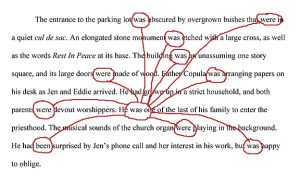
Acquired from the internet Hive Mind
It’s baaack. The copula spider. (First post on the topic is Copula Spiders.)
The shiny wore off real quick on being a content editor. Two manuscripts and thousands (2% of the documents) from the “to be” family – mostly “was” and “were”.
“Editors are to leave writers’ voices intact,” claims a would-be author. “My voice is passive.”
“Your voice doesn’t sell.” I move to the next story in the slush pile.
I’m not the only editor, or writer, running into the problem. “Was” and “were” are easy to use. One of my friends fixing a returned manuscript, complained her editor (not me) marked all the “was’es”.
“Was! Oh bane of my existence! Stop tormenting me … (cries)” she posts on Facebook.
New to content editing, I reached out and I asked her about it, and her editor replied (I guess my friend was still busy killing the “was’es” or crying, likely both as she said she averaged 5 was’es a page in her opus). The other editor wrote: “Basically ‘was’ is either taking the place of or weakening a stronger verb.“
Copula is “a connecting verb, in particular the verb ‘be’ connecting the subject and a complement”. The “to be” family includes: am, are, is, was, were, been, has been, have been, had been.
A copula spider happens when you circle all the was’es on a page and connect them. If eight or more legs result, you have a spider.

Was / were / is – the most evils of evils making writing weak. The Copula Spiders must be burned. Kill the spider. Have no more than five “was” ”were” ”is” on a page (one if an action sequence). Six would be a copula insect – and even those are unworthy of your efforts. Remove any of them running through your manuscript. Kill the spiders – burn the house and rewrite the section if you must.
READING EXERCISE: Find your favorite writer, action-based is best but any will do, see how many pages you go before you count ten copula usages.
WRITING EXERCISE: Take an action scene out of your present work-in-progress (WIP). Remove as many was-were-is from the scene as you can. Compare the original scene and the resulting scene for pace and verbiage impact.
coppula spiders! Got it.
Must assimilate information.
If you are writing in first person, and taking out the spiders changes the “voice” of the character telling the story, or even changes it from first to third person. Then…
stupid thought #1, whole milk, non-fat milk, organic milk, and powdered milk should all taste the same. They are all milk. Are you writing a 3% non fat organic book? If the only milk you can buy is 3% non fat does that make whole milk bad?
To much thinkage. Going to try writing exercise.
No doubt the voice will change as word choice is one of the strongest components of voice, but voice in a manuscript is more a chorus than an individual voice. Character voice, author voice, and genre voice drive the overall voice of a story. Controlling copula reflects closest to genre voice. I have discovered information transmittal formats like non-fiction are copula heavy (such as this message), but action-genres of sci-fi, urban fantasy, and thriller actively reduce passive or non-verb oriented language seen in copula-heavy sentences.
If the first character POV is sharing information at a non-fiction manuscript level, likely too many info-dumps are occurring and the manuscript should be adjusted to balance narrative and action better.